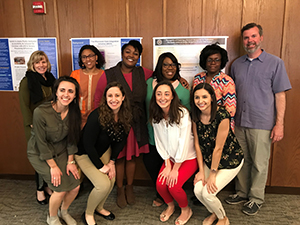From Research to Practice - Wisconsin LEND: Milwaukee Link trainees engage in data analysis to develop the Family-centered Autism Navigation (Family CAN) Interview
April 17, 2019

|
The Wisconsin LEND: Milwaukee Link program is a satellite program of the Madison-based LEND program that is offered at the University of Wisconsin-Milwaukee. As an extension of the Wisconsin LEND program, Milwaukee Link trainees have the opportunity to engage in leadership training focused on enhancement of service delivery for children with autism spectrum disorder (ASD) and other developmental disabilities with ethnic and/or economic diversity. Research experiences are an integral part of a trainee's leadership development.
Recently Milwaukee Link trainees participated in a research experience that contributed to the development of the Family-centered Autism Navigation (Family CAN) semi-structured interview. The Family CAN interview is administered by a family navigator aimed at facilitating the family's ability to locate resources and navigate systems of care after a child receives an ASD diagnosis. The Family CAN interview provides a systematic way to develop a shared navigation plan for providers and families and to document caregivers' concerns.
Milwaukee Link trainees, Amy Lang, LaKesha Petigrew, and Alexandria Hagen, from the 2017-2018 cohort, were integrally involved in the development of the Family CAN interview. They learned about survey research and data analysis using a constant comparative method as they analyzed qualitative data from a survey that was shared with parents of children with ASD and care coordinators who served families of children with ASD.
In particular, Amy Lang found the research experience of evaluating the utility of the Family CAN interview to be especially helpful in advancing her research, as well as leadership skills. As a clinical psychology doctoral student, Amy was able to apply her previous knowledge of measurement development, qualitative data coding, and neurodevelopmental disorders to help critically critique the Family CAN interview, while also gaining valuable specialized experience in the development of an ASD navigation tool as part of a multidisciplinary team. She has had continued contributions to this project through interpretation of the results of this study, writing portions of the manuscript, and preparing the manuscript for publication







